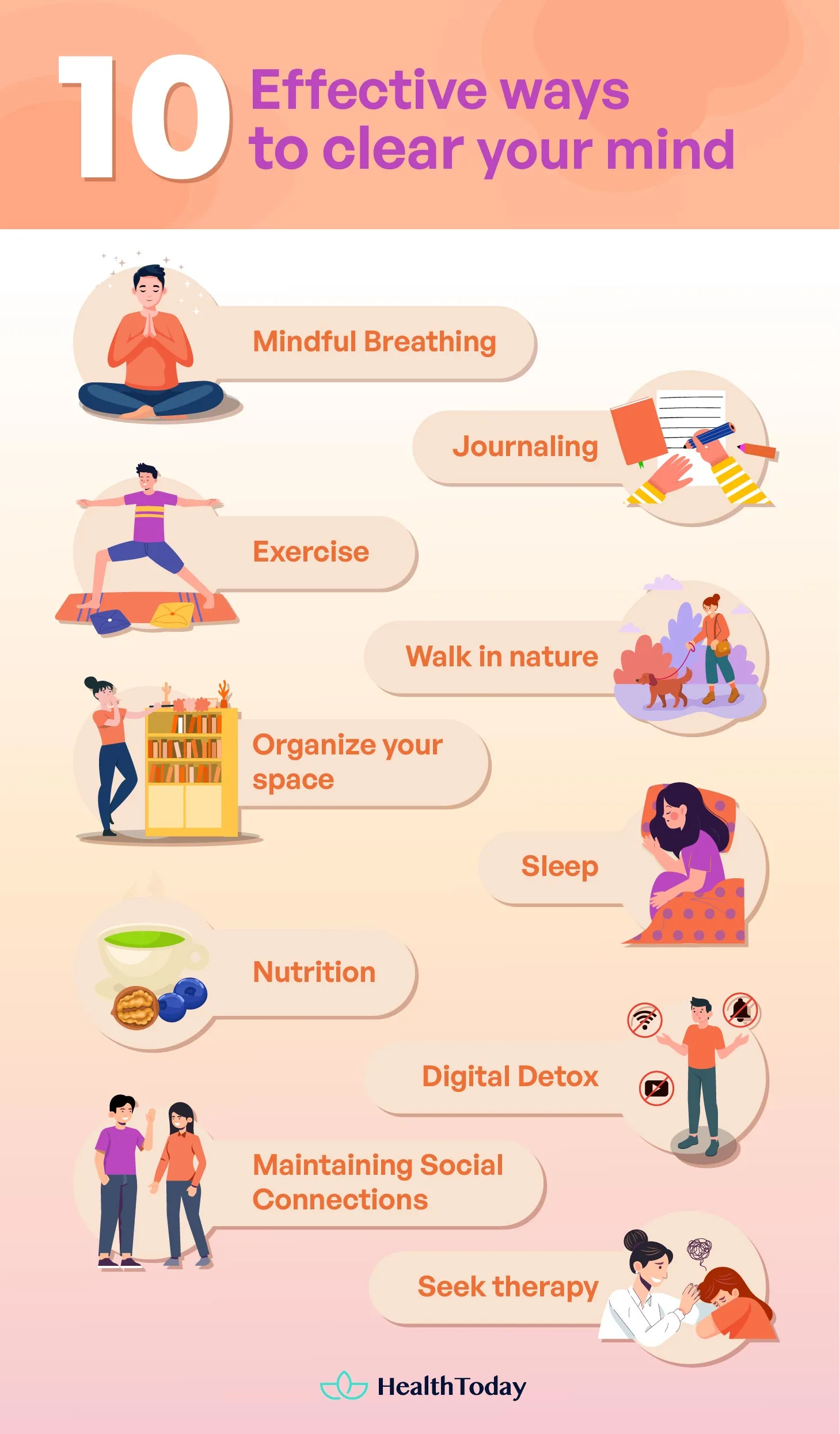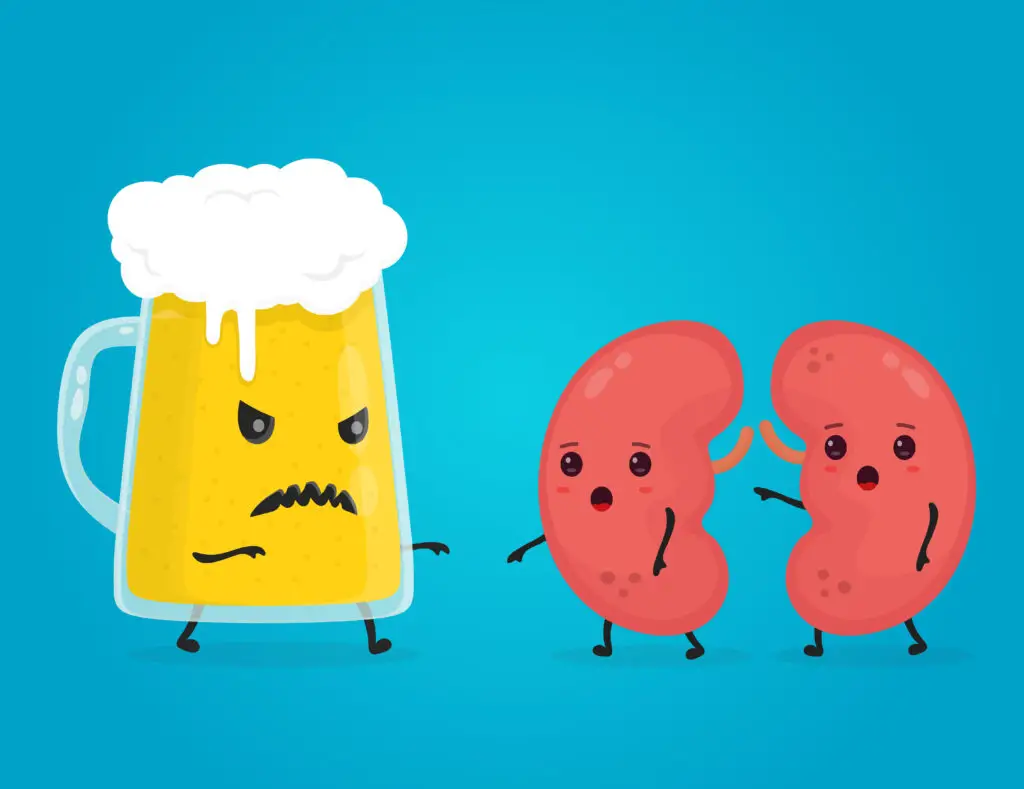Table of Contents
In our constantly connected, ceaselessly bustling world, we often find our minds bombarded with different thoughts. As these thoughts build up, they often muddy our mental clarity, leaving us unfocused and unproductive. Eventually, the need to know ways to clear your mind, like how to get rid of dirty thoughts from the mind, becomes more than just an afterthought – it becomes a necessity.
In this guide, we will show you 10 ways to clear your mind with the backing of scientific evidence. We hope to help you regain your focus and restore the calmness of a clutter-free mind.
10 effective ways to clear your mind
A comprehensive mind cleanse can clear your brain fog, making you more calm and focused. Here we introduce ten practical strategies on how to empty your mind.

1. Mindful Breathing
Mindfulness practices, especially those focusing on breath, have been scientifically validated to soothe the nervous system and enhance mental health (1).
A study showed that a group of people who went through eight weeks of mindful breathing practices had higher cognitive functions and performed better on specific tasks (2).
To practice, find a quiet space, sit comfortably, close your eyes, and concentrate on breathing. Inhale deeply through your nose, hold your breath for a few seconds, and then exhale slowly through your mouth.
Try doing this for five minutes daily, gradually increasing the time as you get more comfortable with the practice.
As you become more comfortable with mindful breathing, you can join yoga or formal meditation practices.
Yoga combines physical postures, breathing exercises, and meditation, providing a multifaceted approach to clear the mind. While it may seem like a practice only suited for older adults, studies have shown that kids who embrace yoga often are more self-controlled and have better academic performance (3).
Meditation also comes in various forms. Guided meditation, transcendental meditation, loving-kindness meditation, and many others offer different paths to the same destination: a clear, focused mind (4).
2. Journaling
How to clear your mind to focus? Just write it down.
The written word is a powerful tool in our quest for mental clarity. This simple yet profound act allows us to express emotions, process experiences, and cultivate a clear mind.
Research suggests that writing about thoughts, emotions, and experiences can reduce stress and anxiety, improve mood, and boost cognitive functioning (5, 6).
Starting a journaling routine might sound intimidating at first, but it’s more straightforward than it seems. Here are some steps to get you started:
- Select your medium: It could be a traditional notebook, a digital file, or even a specific journaling app. The key is that it’s a place where you feel comfortable expressing yourself openly.
- Create a routine: Try to have around 10-15 minutes each day for this practice. It could be in the morning to set your intentions for the day or at night to reflect and unwind.
- Let it flow: Don’t worry too much about structure or grammar when writing. Write freely about your thoughts, feelings, experiences, fears, dreams – anything that comes to mind.
- Start with prompts: If you find starting challenging, they can be a great help. Try ‘What am I feeling right now?’ or ‘What made me smile today?’
- Include doodles and sketches: If you feel blocked with words, try drawing, doodling, or sketching your thoughts and emotions.
3. Exercise
Picture a runner’s high, the endorphin rush following an intense workout, or the calm serenity that settles after a stretching session. These moments are a testament to the profound impact of physical activity on our mental health and clarity.
Regular physical activities can support cognitive function decline and enhance mood (7, 8). Research even suggested that 15-minute exercise can immediately improve executive function and decrease stress levels (9).
To fully harness the power of physical exercise, consider incorporating a mix of these exercises into your routine. Here’s how:
- Start slow: If you’re new to exercising, start with low-impact activities like walking or beginner’s yoga. Gradually increase intensity as your fitness improves.
- Consistency is key: Try to be active most days of the week. Even 15-30 minutes of moderate exercise daily can make a significant difference.
- Listen to your body: Rest is crucial for recovery. If you feel sore or overly tired, give your body time to rest and heal.
4. Walk in nature
A stroll through the park has been shown to detox your mind in unique ways that a gym or urban environment simply can’t replicate.
A 2015 study showed that individuals who walked for 90 minutes in a natural area, as opposed to an urban setting, had decreased activity in the part of the brain associated with rumination (10).
Rumination is a repetitive thought pattern focused on negative things, closely linked to depression and anxiety. Therefore, reducing rumination can significantly clear the mind and support mental health.
Try having brief periods in green spaces throughout your day. Leave technology behind during these walks to deepen the sense of relaxation and connection with nature. Sharing this nature walk with a friend or family can improve mental health.
5. Organize your space
Your physical environment has a significant impact on your mental state. Clutter is not just an eyesore but can also be a significant source of mental distraction.
Researchers found that visual stimuli—like the chaos of an unorganized room—compete for our neural representation. In other words, clutter demands our attention, decreasing performance and heightened stress (11).
Another research points out that women who see their homes as cluttered and messy tend to feel increasingly depressed as the day progresses. On the other hand, those who perceive their homes as more restorative or tidy tend to feel less depressed as the day goes on (12).
So, how does one declutter their mind by organizing their space? Here are some actionable and practical steps:
- Create a Routine: Dedicate a specific time each day or week to organizing your space. A 15-minute tidy-up at the end of each day can be sufficient.
- Declutter: Get rid of items that you no longer use or need. If an item doesn’t serve a purpose or bring you joy, it’s likely just adding to your clutter.
- Organize: Give every item a designated place to help you keep track of things easily, and you’ll spend less time looking for misplaced items.
- Create Zones: Try to create separate zones for different activities. For instance, have a specific area for work, relaxation, eating, etc.
- Personalize Your Space: Add personal touches that make you happy. This could be photos, artwork, plants, or anything that contributes to a positive and calming atmosphere.
6. Sleep
Quality sleep is vital for brain function.
Research suggests consistent, quality sleep fosters mental clarity and optimal cognitive function (13, 14). One study indicated that sleep deprivation could result in cognitive lapses and diminished attention, underscoring the importance of adequate rest (15).
Given the important role sleep plays in mental clarity, consider the following actionable tips to enhance your sleep quality:
- Establish a regular sleep schedule
- Sleep in a quiet, dark, and cool room
- Limit caffeine and alcohol 4 hours before bedtime
- Practice relaxation methods ( stretching, journaling, meditation) before bed
7. Nutrition
A balanced diet rich in particular nutrients can significantly enhance brain function, supporting mental clarity (16).
In particular, several foods and beverages have been scientifically linked to improved cognition and mood, including:
- Green tea: It’s more than a comforting beverage; it’s a cognitive booster. A study found that green tea significantly improves cognitive function, particularly working memory (17, 18).
- Nuts: Nuts, particularly walnuts, are rich in DHA, a type of Omega-3 fatty acid. DHA has been shown to protect brain health in newborns, improve cognitive performance in adults, and prevent age-related cognitive decline (19).
- Blueberries: These small berries are packed with antioxidants, particularly flavonoids, that delay brain aging and improve memory (20, 21).
8. Digital detox
In an era where our lives are more intertwined with the digital world than ever, a digital detox can provide substantial benefits for mental clarity.
Research suggests that envy caused by social media can lead to higher levels of anxiety and depression (22).
Another review showed that digital detox apps serve as a useful tool in protecting young people from the negative impacts of excessive social media usage by reducing the risk of compulsive smartphone use (23).
To actionably incorporate a digital detox in your life, you can try the following:
- Set clear boundaries: Decide on a realistic timeframe for your digital detox. This could be as small as designating an hour each day free of electronic devices or as extensive as scheduling an entire weekend to unplug.
- Create a tech-free zone: This can include the bedroom, the dining table, or any place where you would like to encourage conversation and interaction without the interference of digital devices.
- Turn off notifications: Turn off non-essential notifications on your devices. This way, you won’t be constantly drawn to check your phone or tablet.
9. Maintaining Social Connections
The power of human connection regarding mental clarity and well-being cannot be overlooked.
Multiple research suggests that strong social ties can bring many mental health benefits, including lower levels of anxiety and depression, better cognitive functions, and increased empathy (24, 25, 26).
You can start with something simple, like setting aside a few minutes each day to text or call someone you care about, which can be a great way to share your experiences and relieve stress.
You can also join a community group, sports team, or hobby club. This offers a sense of belonging, introduces you to new people, and can provide a comforting network of support.
Moreover, focus on cultivating meaningful relationships, not just expanding your social circle. Relationships where you can be authentic and share freely are worth investing time and energy in.
10. Seek therapy
At times, the weight of our thoughts and emotions can be too much to carry alone, making our minds feel cluttered and overwhelmed. Cognitive Behavioral Therapy (CBT) can provide substantial help in these times.
CBT aims to help people understand how their thoughts and feelings influence their behaviors. Identifying and challenging destructive thought patterns can help reduce negative emotional responses and behavior, creating a clearer, more peaceful mind.
Remember, seeking professional help is a sign of strength, not weakness. It’s about taking control of your mental health and striving for a clearer, healthier mind.
You can enhance mental clarity through lifestyle modifications, including mindfulness practices like breathing exercises and journaling to process emotions. Physical activity, from high-intensity workouts to peaceful nature walks, aids mental health and cognitive functioning. Maintaining an organized environment, adequate sleep, and a balanced diet improve mental clarity. Digital detoxes and strong social ties further promote a focused mind. Last but not least, professional help can be an invaluable resource when emotions become overwhelming.
How to get something off your mind permanently?
Sometimes, thoughts or memories can persistently intrude into our minds and distract us from daily tasks, leaving us in constant distress. Here we provide a plan to help you permanently get unwanted thoughts out of your mind.
The first step is to acknowledge the thought or memory that’s bothering you.
The human mind tends to push away uncomfortable thoughts, but this often causes them to become even more persistent. Instead, try to approach these thoughts with acceptance and understanding.
One effective way to gain control over your thoughts is through mindfulness meditation. Focusing on your breath or a particular object helps train your mind to stay focused on the present moment instead of being pulled into the past or the future.
Journaling can also be a powerful tool. Writing down your thoughts helps to get them out of your head and onto paper. This can provide a new perspective, allowing you to understand and process your thoughts more effectively.
In some instances, seeking help from a mental health professional may be beneficial. Cognitive Behavioral Therapy can help you identify and challenge unhealthy thought patterns and develop healthier responses.
Finally, be patient with yourself. Changing thought patterns takes time and practice. Do things that bring you joy, spend time with loved ones, and take care of your physical health. These actions can boost your mood and make it easier to manage negative thoughts.
How to get rid of intrusive thoughts from the mind
Imagine you’re walking down the street, minding your own business, when suddenly, a strange thought pops into your head. It’s a thought you find distressing, inappropriate, or what some might call “intruding.”
You’re startled, and you may even feel guilty or disgusted. You wonder, “Why is my mind so dirty?”
Why is my mind so dirty?
Firstly, it’s important to know that these so-called “intrusive thoughts” are a universal human experience.
It doesn’t make you a bad person – in fact, it means you’re just like everybody else. Intrusive thoughts often appear more frequently in times of heightened stress or anxiety.
The sudden appearance of an intrusive thought might feel like being drenched by a sudden downpour on that otherwise peaceful walk. But, just as you wouldn’t blame yourself for the weather, there’s no need to blame yourself for these thoughts.
Now, let’s look at some strategies for dealing with these unexpected showers of the mind.
How to get rid of intrusive thoughts
When the thoughts start to pour, mindfulness meditation offers a valuable umbrella. Mindfulness practices can help alleviate the distress caused by unwanted intrusive thoughts.
Just as observing the drops as they fall and recognizing that they will soon pass, mindfulness teaches you to observe your thoughts without judgment, understanding them as natural and temporary mental events.
Yoga, deep breathing, and other mindful practices can help you find peace amidst the storm.
Moreover, maintaining a healthy lifestyle can bolster your mental well-being and increase your capacity to manage intrusive thoughts. It’s like wearing a raincoat to make you more resilient to the weather.
Finally, building strong social connections can help divert your mind from intrusive thoughts. Regular social activities can provide warmth and light on a stormy day.
How to clear your mind from stress and anxiety?
Overcoming stress and anxiety requires a multifaceted approach. Practicing Yoga improves your physical fitness and introduces you to deep-breathing exercises and meditative states that naturally reduce anxiety. A relaxing hobby such as painting, knitting, or gardening can also provide a calming outlet for stress. Lastly, reaching out to a trusted friend, family member, or professional can provide emotional support.
How to clear your mind to focus?
Having a clear, focused mind is often about creating the right environment. A clutter-free workspace can make it easier to focus on your tasks. Noise-canceling headphones or ambient noise can provide a background soundtrack that helps concentration. You can also try techniques such as visualization, where you imagine the process of your task, which can motivate you to stay focused.
What are synonyms of “Clear mind”?
While “clear mind” is a common phrase, there are numerous ways to express the same idea. Some alternatives could be a “sharp mind” or a “refreshed mind.” You might also consider phrases like “mind in harmony,” “de-stressed mind,” or “mind in balance.”
What is “freeing your mind”?
Freeing your mind is about achieving mental flexibility and openness. It’s breaking away from limiting beliefs and adopting a more open, accepting attitude. A free mind releases stress and worries to create space for curiosity, peace, and creativity.
Emptying your mind and restoring mental clarity doesn’t have to be an uphill battle. Adopting mindfulness practices and prioritizing your physical health to embracing a digital detox, there are numerous ways to clear your mind. If you’re struggling with negative or unwanted thoughts, there are proven ways to eliminate intrusive thoughts from your mind.
Using these tactics, you can journey towards a clear head and find a way to refresh your thinking.

















Comments
0